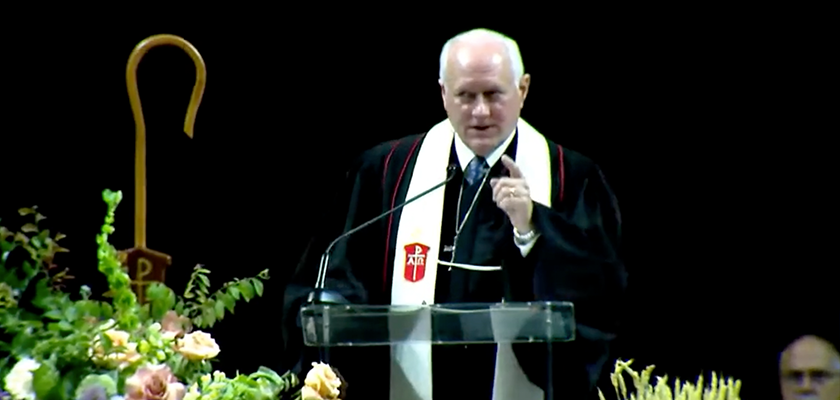Bishop David Graves of the United Methodist Church's (UMC) Alabama-West Florida Conference (AWFC) delivered the opening remarks at the annual conference on Sunday as churches in the state's southern half continue to weigh disaffiliation from the denomination.
The UMC is currently undergoing a significant division as traditional churches are pursuing disaffiliation in light of a growing faction of progressive Methodists pressuring the church to change its Book of Discipline, which sets forth the law and doctrine for UMC churches.
"God is not finished with us called United Methodists," Graves began. "... After we have gathered and we have scattered, I hope that ministry becomes even more meaningful than it has been. There is boldness in your step and courage to overcome everything that disappoints us."
Since December, over 500 Methodist churches have left the UMC in Alabama alone. The churches used a provision in the Book of Discipline known as Rule 2553, which established a process for churches to disaffiliate while retaining church property.
Under rule 2553, churches have until December of this year to disaffiliate. If they do not break away by then but decide to disaffiliate in the future, they could be forced to surrender church property, which, in the case of some churches, is over 200 years old.
Traditional Methodists initially pushed for rule 2553 to allow progressive churches to disaffiliate in light of growing tensions between the two factions around social issues and underlying theological disagreements.
However, as progressives grew more powerful in the UMC, traditional Methodists feared the progressives might be able to make changes to the Book of Discipline during the next General Conference in 2024, potentially threatening orthodox doctrine surrounding same-sex marriage and the ordination of practicing homosexuals, among other theological disputes such as the divinity of Christ or the authority of scripture.
In his speech, Graves admitted to being exhausted by the infighting. In the past, he has been an outspoken advocate for churches to remain in the UMC.
"You know, I've seen the things, people taking selfies outside the annual conference," Graves said. "They even refer to the bishop as the soprano bishop. They don't know me very well. You know, I just want life to be normal again. Don't you? I'm kind of over it."
"We have tried to answer all the questions and thoughts about how we can come out of COVID, how we can try to give everyone a chance to make decisions about their path forward about being in the [UMC] or getting out," he continued. "While I have tried everything in my power to try and tell people to stay in until we get through General Conference 2024, when we have all the facts to make better decisions. No matter what we try to do, most people want to do what they want to do. Have you ever noticed that? … We brainstorm. We play parliamentary gymnastics. And it really gets us nowhere. I have come to realize that we don't know the answers. And it really gets us nowhere. Jesus is the only one who is going to save us."
This year's annual conference follows the release of an updated disaffiliation eligibility policy last week, which conservative Methodist leaders call a "nail in the coffin" for churches seeking to leave the denomination through rule 2553 but have not yet completed the process.
The updated policy now requires that the Church Council of churches in the AWFC which seek to enter the disaffiliation process "adopt a statement of eligibility that demonstrates the current and specific disagreement(s) that the local church has with the changes in the Book of Discipline made in 2019."
Traditional Methodists have suggested that the policy, in effect, limits rule 2553 disaffiliation to progressive churches seeking to leave the denomination and prevents traditional churches acting in good faith from leaving out of concern that the UMC has grown too theologically liberal.
As traditional churches have made up the vast majority of churches that have already disaffiliated, this could mean the progressive faction in the General Conference would be much larger in proportion to the number of overall members.
"People are worried about stuff," Graves said. "They're worried about stuff and property and saving my church. Friends, it's not your church anyway. It's not my church. It's God's church. And, you one day, all this is going to go away anyway. What lives forever is in eternity in heaven, so let's start acting like it."
To connect with the author of this story or to comment, email will.blakely@1819news.com or find him on Twitter and Facebook.
Don't miss out! Subscribe to our newsletter and get our top stories every weekday morning.










